|
July, 2005
Aug. 2005
Sept. 2005
Oct. 2005
Nov. 2005
Dec. 2005
Jan. 2006
Feb. 2006
Mar. 2006
Apr. 2006
May 2006
June 2006
July 2006
August 2006
September 2006
October 2006
November 2006
December 2006
January 2007
February 2007
March 2007
April 2007
May 2007
June 2007
July 2007
August 2007
September 2007
October 2007
November 2007
December 2007
February 2008
March 2008
April 2008
May 2008
June 2008
July 2008
August 2008
September 2008
October 2008
November 2008
December 2008
February 2009
March 2009
April 2009
May 2009
July 2009
August 2009
September 2009
November 2009
December 2009
January 2010
February 2010
March 2010
April 2010
May 2010
ČERVENÁ BARVA PRESS NEWSLETTER
Gloria Mindock, Editor Issue No. 56 June, 2010
INDEX
Welcome to the June, 2010 Newsletter!
In Memoriam: Rane Arroyo 1954-2010
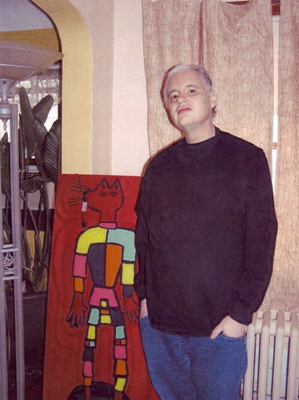
On May 7th, Rane passed away of a Celebral Hemorrhage. Rane is survived by his partner of 28 years, Glenn Sheldon, his mother,
Nelida Arroyo, a brother, Mike Arroyo, a sister, Marje Szinavel and their families, many aunts, uncles, cousins, and his beloved
friends and his cats.
I am still in shock over Rane's death. Rane was a wonderful friend, poet, and playwright. I first became aware of Rane's poetry
in the 1980's and was hooked on his work ever since. I was so happy to have published him in the Boston Literary Review/BLuR as
well as his partner, Glenn Sheldon. Rane also was a playwright with a theatre and performance artist background like me. His plays
are wonderful and it meant so much to him when they were published and produced. Rane has published 11 books of poetry, a book of
short stories, numerous plays, the recent published by Ahadada Press called, Dancing At Funerals: Selected Plays.
10 of his plays have been produced. He won
numerous awards for his poetry including the John Ciardi Poetry Prize, the Carl Sandburg Poetry Prize and a Pushcart Prize.
Rane's poetry and plays will be archived at the University of Michigan.
Rane was always humble about his accomplishments. On the phone, he would tell me he was up for an award but didn't understand all the
fuss about his work. Rane's writings brought us into his world at times of what it is like to be a Gay Puerto Rican poet. Rane
was proud of his heritage and grew up in Chicago. I always joked, "a fellow Midwesterner" coming from Illinois myself.
He was a professor at the University of Toledo. His students loved him as a teacher and I know Rane loved teaching. He was a
mentor for so many. Rane also served as a board member for AWP for 5 years and was responsible for the AWP conference /Chicago
in 2009.
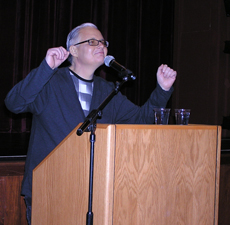
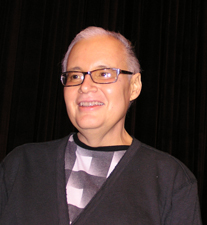
I really want to focus on Rane, my friend. Rane had a way of always making me laugh. He was so witty and always looked at life
as a gift. Even though he was waiting for a liver transplant, he would always say, I had a good life. Rane never felt sorry for
himself, never complained, and always kept things in perspective. Many of his e-mails and phone conversations had me laughing and
some brought out the radical in me which I loved! He always referred to Glenn as GL in his e-mails.
The beautiful things he said about his partner, Glenn will remain private.
I could tell how much he loved Glenn by what he said. Yes, quite a love story which we all would be so lucky to have. Rane was
extremely private and I understand that. Some of my memories of conversations will always remain private and cherished.
I will share one cute story with you. Since Rane was in charge of the AWP conference in Chicago in 2009, we decided to dye our
hair bright red for the conference. We laughed so much at this for various reasons. This appealed to me because I have had so
many shades of red as my hair color. I also always loved to shake things up. Rane was the same. It must have been the theatre
in us. Rane e-mailed, For you, I hope to be a red-head in frigid Chicago. Unfortunately, neither of us followed through. Rane
could not travel far because he was on the transplant list at Cleveland Clinic. He only ended up at the AWP Conference for one
day and the next day had to return home. This was the first time I met him. Before this, it was years of e-mailing and phone
conversations with him and Glenn. I was so happy to meet him. Glenn, Rane and I went for dinner at an Indian restaurant and then
back to their suite. What an evening it was! I can't even remember laughing as much as I did in their suite.
I met Stacia Fleegal, Dan Nowak, Teniece Delgaldo, and some others. All we did was laugh, talk and party.
I laughed so hard that it was difficult to breathe. I loved Glenn and Rane's friends. They all are just precious. I will never
forget my time at AWP.
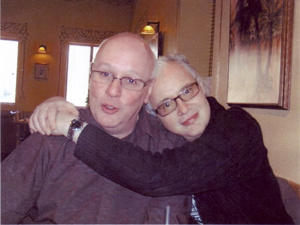
Rane and Glenn published chapbooks and books for many years. Their press is called New Sins Press. Oh and yes Glenn, I still
have that T-shirt that says, "I think I feel a sin coming on." What a great T-shirt!!!! They have published incredible writers
over the years. It is because of Glenn and Rane that I found a printer I use for publishing my books. I cannot thank them enough
for this. I learned so much from them.
Rane, will always be a part of my life. I know he is watching over his friends and family. He most likely would be somewhat
embarrassed that I am writing about him. There are very few in this world that I feel a strong bond with. Rane is one of them.
Words can't even begin to come out to explain how much I loved him. His words are forever with us with his brilliant poetry and
plays. It is with such humbleness I tell you that Rane gave me his manuscript, "White As Silver" to publish. It is such an honor
to publish this book. Glenn will be helping me with the proof and other things needed for it.
Rane trusted me to publish this book and I am so happy
and excited to publish it. The poetry is just amazing.
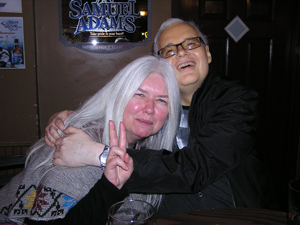
One of Rane's dear friends, Susan Deer Cloud, sent me all the photos for this newsletter. Thank you so much Susan for your
e-mails and help. I have heard so many wonderful things about you from Rane and Glenn. I hope someday to meet you.
I love the picture of you and Rane posted here.
There will be a tribute for Rane at the AWP conference in DC in 2011. Glenn is still in the process of planning it. I hope to
see you there. Other tributes are in the planning stages. When I know more information, I will let you know.
Since Rane loved cats so much, donations in his memory can be made to:
Paws and Whiskers, Cat Shelter, Inc.
32 Hillwyck Dr.
Toledo, OH 43615
Phone: (419) 536-1914
http://pawsandwhiskers.org/
Rane Arroyo's chapbook and book publications:
- Death Cab for Cutie, New Sins Press, 1990
- Television Poems, Anaconda Press, 1992
- The Red Bed, Sonora Review/University of Arizona, 1993
- Columbus' Orphan. JVC Press, 1993
- The Singing Shark, Bilingual Press/Arizona State University Press, 1996
- The Naked Thief, Stonewall Books, 1997
- Pale Ramón, Zoland Books, 1998
- Weekends in Ohio With Ghosts, Last Minute Press, 2000
- Home Movies of Narcissus, University of Arizona Press, 2002
- Don Quixote Goes To The Moon. Ahadada Books, 2005
- How To Name A Hurricane, University of Arizona Press (fiction), 2005
- The Portable Famine, BkMk Press/University of Missouri-Kansas City, 2005
- The Roswell Poems, WordFarm Books,2008
- Same-Sex Séances, New Sins Press, 2008
- The Buried Sea: New & Selected Poems, University of Arizona Press, 2008
- The Sky's Weight, Word Tech Press, 2009
- Dancing At Funerals: Selected Plays, Ahadada Press, 2010
- White As Silver, Červená Barva press, forthcoming
White As Silver
December, how easily you
dissolve this sad shining day.
It’s just dense snowflakes melting
on my expensive boots.
Storm warning: a theater of
cold is on tour from Utah and
I loved there before I knew
the below-the-waist was mine.
I’m my own home. Icy clouds are
eclipses, white as silver. Snowmen
refuse to believe humans are their
creators. Taxis don't know where
Paradise is, should be. I know
that this opaque city will shine.
I was unknown when with you.
Soon, there’s tinsel and eggnog.
Copyright by Rane Arroyo
From White As Silver by Rane Arroyo, Cervena Barva Press, forthcoming
Červená Barva Press News for June
Červená Barva Press will be represented at the following:
Marymount Writers conference
Marymount College/Manhattan
221 East 71st St.
New York, NY
June 3rd
Session IV, 3:15-4:15
Small Press panel members are: Eric Darton, Richard Peabody, Gloria Mindock, Fran Metzman, and Susan Finelli
Moderator: Susan Tepper
Literary Publishing Intensive Class at Emerson College, Boston, MA
June 11th, 2:30
(Gian Lombardo's class)
I will speak about Červená Barva Press and my publishing experiences with a question and answer period to follow.
William Joiner Center/UMass, Boston
June 21st, 1:30-3:30 in Wheatley 1-6
Panel: George Kovach, Gary Metras, Gloria Mindock, Askold Melnyczuk, Catherine Parnell, Mark Pawlak, Joseph Torra
The Evolving Community of Publication
This panel will discuss how modern technology has changed the literary landscape in terms of accessibility to print versus
literary quality. Topics will include how a literary magazine or small press can be a vehicle for community among writers,
what communities (readers, writers, artists, activists) are attracted to what print forms, what letterpress chapbook design offers
to readers and writers, how literary magazines inform small press publication (and the other way around), what is happening to the
traditional literary magazine and small press - and how we, as writers, find our way through the ever-evolving world of print publication.
Editors from small presses, chapbooks and literary magazines will discuss their experiences in this challenging new world of
publication.
Coming in JULY
Chapbook by Jendi Reiter (winner of the 2010 chapbook Poetry contest)
Books by: Roberta Swann, Denis Emorine

VOICE OF THE HUB
"Poems from the Left Bank: Somerville, Mass."
Doug Holder
Propaganda Press 2010
32 pages
"POEMS from the LEFT BANK: Somerville, Mass."
Doug Holder's lively new chapbook with fine cover art by Richard Wilhelm,
emerges from America's intellectual omphalos: the Boston hub of Cambridge and Somerville, Massachusetts. In "Poems from the Left Bank"
Holder demonstrates his wit in "Pet Store": "I always feel attractive at the pet store./ The birds are animated when I come through the
door,/ They whistle lewdly in my direction." These Larkin-esque end rhymes sing within the witty opening lines of the first of four
stanzas that bear witness to Holder's unique take on life. In the same stanza he uses the phrase "rat race"; he's unafraid of
employing colloquial language in an original context. Holder meets Ezra Pound's famous aphorism to: "Make it new!"
Holder's boldness may stem from his background as a New York City native, and his milieu is decidedly urban. His panache seems
to have found a home in Somerville, Massachusetts, the city just north of Cambridge, home to Harvard University, Holder's alma mater.
In "Two Old Women" and "Bottle Lady, School St., Somerville" Holder observes the quotidian in characteristically unpretentious terms:
"Two old women/ Walk down my street/ Each morning/ Lugging two shopping bags"/ . . . The poem: "Two Old Women" continues with
phrases: "A tight embrace" and "Pushing each other/ At no more than a snail's pace." Then the poem resumes with a repetition of
"Each morning/ . . ." The art to Holder's free verse is subtle, involving parallelism and repetition, and as the poem ambles on a
powerful alliteration: "A daily ritual of decrepit defiance/ Walking the ground/ That will own them/ Once again."
It's refreshing to see and hear, and perhaps even sniff, the side of the Hub just a snowball's throw from storied Harvard Yard.
In "Bottle Lady" Holder observes that not everyone is a moneyed child of privilege who recycles for a good conscience:
"Her shopping cart is full/ Of plastic bottles./ She swept away/ A gross of Schweppes - /They are now voids of scented
air./ She fingers the long necks/ Of bottled Black and Tans,/ Stouts, Porters,/ Many hours ago/ They long lost their/ Ten-minute heads."
Rarely have beer bottles been put to such good use, by not only this "Bottle Lady" but also by Holder in this poem of a real world apart
from the realm of mere intellectual entertainment. This poem also hearkens back to Wallace Stevens' brief modern masterpiece: Anecdote
of a Jar." In stanza two of the same poem Holder continues: "The pickings are never slim/ For this Haitian lady/ Who mumbles Creole/
Sporting a broad-rimmed hat/ Followed by a black, weather-beaten cat." Doug Holder's direct approach reminds one of the
earthiness of both Allen Ginsburg and Philip Larkin in "Sad Steps." While Holder's poems often involve short lines, he
does employ rhyme, on occasion, and always for a powerful and subtle effect.
Other recent books by Doug Holder include a full-length collection of poems: "The Man In The Booth In The Midtwon Tunnel"
and a collection of Holder's interviews: "From the Paris of New England: Interviews with Poets and Writers."
—Daniel Picker
Daniel Picker has published reviews, articles, and poems in: Harvard Review, The Philadelphia Inquirer, Soundings East, Seaqoia,:
The Stanford Literary Review, Vermont Literary Review, Elysian Fields Quarterly, The National Baseball Journal, The Dudley Review
at Harvard, Rune: MIT Journal of Arts & Letters, Folio, The Marlboro Review, and many others.

Threads Give Way by poet Shannon K. Winston
Cold Press Publishing, 2010
P.O. Box 200639
Anchorage, Alaska 99520
"Immediately I am struck by the splendor of the images in this book, the richness of the reading, the desire to forge a world on the
page. Yet I believe Shannon K. Winston's poetry finds itself even more when passion meets concentration, even more when the words are
simple and essential, as it was with the beloved Montale. The poet finds a palpable balance in poems like "Fez, Morocco," where thought,
sound, and emotion converge like "sesame seeds blooming" inside of men's mouths. Threads Give Way is a mature debut book.
—Antonella Anedda, author of Il catalogo della gioia
To order: www.coldpresspublishing.com

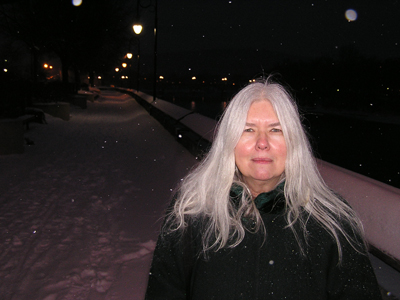
I know you and your work carry such a sense of place (which very much interests me). Tell me about growing up in the Catskills and
how you think that impacts your poetry, if indeed it does?
Being born in and growing up in the Catskill Mountains has nearly everything to do with the poems, essays and stories that I write.
First of all, I carry those mountains in my very atoms; my interior landscape is the Catskills (for any one who doesn't know, the Dutch
called them that because of the panthers they saw there; originally it was Kaatskills, which means Rivers of Cats). I am nearly not
being figurative about this. I feel my body as containing those multitudes Whitman referred to, and my multitudes happen to be hemlock
trees, fiddleheads, red trilliums, river rapids, waterfalls, meadows, caves, deer, bear, eagles, scarlet tanagers, fireflies, and so
much more.
The Catskills are pervaded with spirit, as even the Dutch noted. The hemlocks and mists back then gave the mountains an ethereal
blue appearance that spoke of ghosts. Indian people called its vast, pervasive spirit Manitou. My ancestors showed immense
respect for that high, eroded plateau because of its powerful and eerie spirit, not to be tampered with.
I feel thankful that I am a Native writer who grew up close to the Earth. I am descended from a medicine woman who lived in the
Mongaup River Valley in the mid-nineteenth century and I still have relatives dwelling in this place our ancestors ran to in order
to escape being confined or killed by the invaders. I call the Catskills my "heart country." Not a day flashes by when I don't
experience riptides of homesickness for my heart country.
Firstly, I never know whether to say Indian, Native American, First Peoples, etc. So enlighten me on that. Secondly, you're a
great champion of good poets, as I well know. But what Indian [or another term?] poets should we be reading that maybe we haven't
heard of?
I use INDIAN. Below is an excerpt from a poem I once wrote after three young NATIVE AMERICAN college women and I got into an impassioned
discussion over what term to use:
Hear me, my sisters, I am Indian, in God. Despite all the murdering
the invaders have done these past five centuries, all the taming
they have tried to do, in my red heart I am untamed, a wild, wild Indian
who knows how to run inside the bodies of deer, white buffalo, foxes, wolves,
swim inside fish motion, dolphins, coelenterate, sea stars, rise
inside rain, hawks, spiraling eagles, float in the blue silence
beyond silence of heron, the immense blue. I know how in full
moonlight to give those gifts over to the passion of a lover's arms,
to roll, howl in those sweet, fierce kisses of one who can flesh-fill me
with naked savagery feared only by those who hate what is exuberant, wild,
fearlessly free. Let them think any moment now I might toss
a tomahawk at their shorn heads, for I have proven my prowess
at tomahawk throws. Let them live in terror at all the stereotypes
they have pinned my wings with - the red wild savage Indian. I will
un-stick myself, string their stereotypes like glass beads, turn them
to beauty.
For those who don't know, that accidental tourist, Columbus, first referred to the indigenous
people he encountered as una gente in Dios, "a people in God." Once he decided to use the Tainos as slaves for providing sex and
silver, he stopped praising them for their "godly" qualities of peacefulness and openness. One subject of debate among the
intellectuals and churchmen of that time was whether an Indian was human or not.
More than anything it is how others treat Indian people. Some of those who use the more politically correct terms for us
often prove to be the biggest Indian killers of all (academentia, anyone?).
As much as I want to, I have decided not to give any names for the second part of your question even though there are Indian
writers whose work I respect and admire with all my Métis mountain Indian heart. I see all too often how certain non-Natives
set up one Native writer over other Native writers (we all know their names) and manage to pit us against each other by whipping
up jealousies. So I would say this: If anyone wants to know those writers I love both as human beings and as writers, they can
read the Spring 2008 Issue of Yellow Medicine Review: A Journal of Indigenous Writing, Thought & Art which I edited, or they can
go to my Native anthology I WAS INDIAN (Before Being Indian Was Cool), published by FootHills Publishing. The first volume came
out last September and the second volume will be published this September. Some of these writers have been more or less forced
to live in exile for decades because they have fiercely resisted having their freedom pinned to the fuzzy black velvet of
soullessness.
To what extent does your heritage, as a Métis (Blackfoot, Mohawk and Seneca) influence your art and your relationship to the world?
My heritage completely defined my relationship to the world from the time I was a very small girl. I grew up in the
1950's and 1960's, when Indian people where I lived still were fairly quiet about their Identity. Not being considered quite human
still was a haunting aspect of our lives, hence our silence. Also, I am Métis, a pretty French word for that which we were called
in the mountains: "part Indian." I use Métis especially because of Louis Riel who fought for the rights of "mixed blood" Natives in Canada.
Of course many of us are Métis. How could we not be after five centuries of physical and cultural genocide and still counting?
My Mohawk ancestors reached a point in the seventeenth century when they kidnapped white people and other tribal people to prevent
their own tribe from being decimated to only a few people (I know, I know, there are going to be Native Americans all upset because
I didn't use "nation" there).
This complexity of identity naturally becomes a part of my writing. It caused me to question what schoolteachers and other
"authorities" told me when I was of a very young age. When I write, my fingers are a ghost dance calling back the days before
so many Native people died and before so much of indigenous land, culture and language was stolen. As a woman, I am also acutely
aware of "the Burning Times" and the rapes of indigenous women and all the relentless oppression of girls and women - so my
writing hands are songs of liberation. My fingers are the sign language speaking to the next seven generations to come, inviting
them to be brave as I have had to learn to be brave - asking them to take a stand against vanishing. When I walk out into the world,
in a sense I walk out as an ambassador for my people - not only for Indians, but for poets and artists and country people and
women and the "two spirited" and for anyone who has ever been told they are "no good." I am very traditional in the sense that
I feel passionately my responsibility to others.
A colleague and I have debated a bit about prose syntax and its relationship to poetry. Now I often use the noun-verb-object
structure, but I warn my beginning creative writers away from it. Your voice is one that follows traditional prose syntax and
then breaks it to great effect. So whose side of this debate would you take? Or more appropriately, what's the difference
between poetry and prose when it comes to syntax?
I don't take anyone's side. I don't even care. I have people make various pronouncements about my poetry, including their
sometimes telling me it is prose-y and therefore I should turn it into prose-poems. Indian people regard STORY as poetic,
magical, luminous. I grew up surrounded by storytellers, both Native and non-Native. Stories are mountains made of words,
as far as I'm concerned; they live in the revolutions of my atoms as much as the Catskills do. I am always telling stories in
the oral fashion, and my friends and I riff off each others' stories, poems and jokes. I can't imagine my ancestors stressing
over syntax and what is the difference between poetry and prose. Original Indian languages are all poetry, anyhow. Prose didn't
exist for us in the past and it doesn't exist for us in the present - not if we still carry remnants of our real culture in our hearts.
I happen to write in different ways, and those ways are simply natural to how I am existing in any particular present. Most
importantly, the very act of writing is as ceremony to me.
Ruth Stone has said that your words carry us "into new universes that favor freedom, exuberance and beauty beyond
all heartbreak." As a person, I certainly see that in you. As a friend, you've helped me get beyond some minor heartbreaks.
To what extent are you conscious of allowing your poems to permit your readers such transcendence?
I certainly wish for my poems to bring truth, beauty, freedom and transcendence to those who read or hear them.
I know that the words I just beaded will sound old-fashioned and passé to the jaded and cynical. But I have no
apology for embracing those words made of ancient amber and eagle wings. I am conscious of my poems especially when
I give readings, because that is when I see how they can make others smile, laugh and cry. I am aware that my being a
poet and my poetry, itself, convey to other people that they, too, can be brave. I tell them that I didn't even begin
speaking until I was fifty years old - truly not much of an exaggeration. I was a Sleeping Indigenous Beauty for many
years because of the "evil spell" the patriarchal, colonial world cast on me, although in my case it wasn't a prince's kiss
that woke me but a kick in the ass.
You have had your own poems, stories and essays published in literary jounals, anthologies and books. However, in recent years
you also have edited two anthologies and the Spring 2008 Issue of Yellow Medicine Review. Can you speak a little to why you write
and also to what made you decide to edit the anthologies Confluence and I Was Indian and also Yellow Medicine Review?
I have through the years come to realize that my poetry is closely bound in with my being a Métis Indian woman, and that all its
leafing complexity at best reflects the Iroquois Tree of Peace with its Four White Roots inviting all people in. I am tired of all
the "blood, "blood quantum, race, skin color, sexual identity and class issues slugged out in a neverending arena of hate. I have
seen this crap come from all directions and from all kinds of people, including Indian people. I did not grow up on a reservation
and my family has not ever been rez-connected, so the ones like us sometimes get accused of not being Indian or "Indian enough" from
those whose ancestors didn't run fast enough and hide quick enough. Crazy Horse, Sitting Bull, Chief Joseph, Jigonsaseh, Deganiwidah,
Hiawatha, Osceola and so many great Indians did not carry the colonizers' "you're conquered" cards in their medicine pouches. I am
proud that my family managed to hide out in the Catskill Mountains and preserve what I consider to be the best of being Native. I
love and respect the spirit of Catskill Indians who never surrendered. Right now there is a groundswell, especially in the east and
northeast of Turtle Island, in which people are emerging from the woods and beginning to reestablish what the concentration camp/ reservation
system destroyed in far too many Natives - generous, kind, free and gentle spirits.
I edited the books because I wanted to get out the "voices of the voiceless," those who Martin Luther King, Jr. alluded to.
I emphasize here that I have not only published Indian writers but other writers, as well. I take a close look at the spirit
expressed in people's poems and what they are bearing witness to, what their visions are, and what they have to say to people
now and to people who I believe will need our words and dreams in the future. We all know how bad things have gotten on earth,
the latest being the oil spill in the Gulf of Mexico. All this creating that we do says that there can be something other than
runaway greed and destruction - what Bill Moyers calls "the culture of cruelty." When I do my own writing I am living as a Native
woman and as simply a human being who has not been defeated. When I do my editing I am helping to bring Indian people and other
hungering people home.
In my original home I am friends with you, Glenn Sheldon, maker of wry jokes about being a "white man," because I know full well
what a great hearted man and great poet you are. The same goes for your brilliant partner, Rane Arroyo, and my entire constellation
of friends, dreamer men and women all. My and my friends'creative work dares to reclaim the "Beauty Way" of our stolen first country - the
purely trusting and sweetly exuberant heart.


If you would like to be added to my monthly e-mail newsletter, which gives information on readings,
book signings, contests, workshops, and other related topics...
To subscribe to the newsletter send an email to:
newsletter@cervenabarvapress.com
with "newsletter" or "subscribe" in the subject line.
To unsubscribe from the newsletter send an email to:
unsubscribenewsletter@cervenabarvapress.com
with "unsubscribe" in the subject line.

Index |
Bookstore |
Submissions |
Newsletter |
Interviews |
Readings |
Workshops |
Fundraising |
Contact |
Links
Copyright © 2005-2010 ČERVENÁ BARVA PRESS - All
Rights Reserved
|

